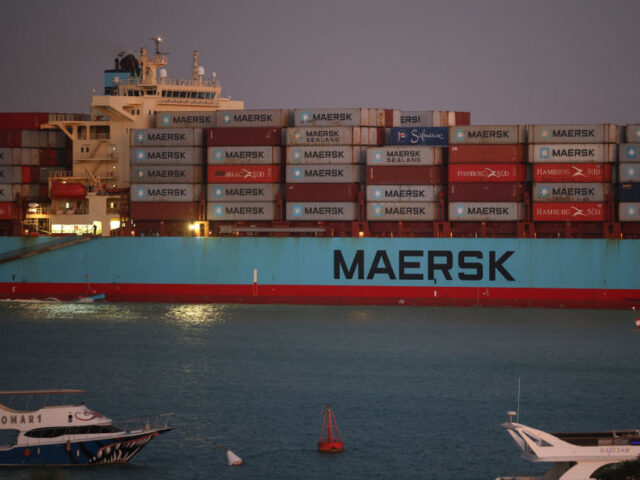British economist warns Western nation’s fight against inflation faces a serious knockback as Iran-backed Islamists attacking merchant ships in the Red Sea are set to send the cost of imports and energy spiraling.
The Red Sea Route, which knocks a week or more transit time from imports of energy from the Middle East and cargo from the factories of China and the East to Europe and the American East Coast has been treated as closed in recent weeks by major shipping companies. Merchant traffic including container ships, car carriers, and oil tankers have been rerouted around the Horn of Africa to avoid the possibility of being targeted by Iran-backed Shiite Islamist Houthi militias, who have been striking ships passing Yemen with drones and missiles.
While the United States has announced Operation Prosperity Guardian, a multinational coalition of ships to defend the crucial waterway, that has been slow to make itself felt and concerns are being expressed that the extra costs being added onto shipping the vast volumes of imports Western nations are dependent on.
Bank of England deputy governor Sarah Breeden has warned rising shipping prices may be a hammer blow to the hopes of many Western governments hoping to get inflation under control. The senior economist at the UK’s central bank is cited by The Times of London as warning extra costs matter because “supply constraints can really matter for monetary policy”, and saying the bank was tracking the issue.
For Import-Dependent West, Costs Will Add Up As Long as Houthis Keep Red Sea Closed https://t.co/jaKab0GdSJ
— Breitbart London (@BreitbartLondon) December 21, 2023
She said: “We have developed a tool kit to track supply constraints for our inputs on what is happening [in global trade]. Given events in the Red Sea, we can incorporate those into our expectations. It is a volatile situation that is only just arising, but we have highlighted and incorporated in our latest projections the upside risks to inflation from developments in the Middle East.”
While sea traffic going around the south of Africa rather than through the Red Sea to the Suez Canal still arrive eventually, the costs of the extra week at sea are not inconsiderable in terms of not just extra fuel and crewing, but crucially in the extra shipping capacity to keep the same amount of trade afloat for longer. As reported, sending container traffic around Africa to Europe could “soak up” something like five per cent of all global capacity.
The massive surge in prices a blocked northern route causes isn’t theoretical: they were seen in 2021 when the container ship Ever Given closed the Suez Canal by accident, which as The Times notes in their own report caused shipping rates to rise to four times their typical levels. Costs associated with attacks rather than an accident could well be higher too, as uncertainty and fear of attack will drive insurance prices higher, and possibly add on the cost of embarking security forces onboard individual ships, as was the case during the height of the Somalia pirate crisis.
Hapag-Lloyd Container Ship Set Ablaze in Red Sea After Yemen Missile Strike https://t.co/wbtk8VWq5b
— Breitbart London (@BreitbartLondon) December 15, 2023
If Western navies that justify their existence on their role of keeping sea lanes open are effectively deployed by governments to keep the Red Sea open, the worst impacts may yet be avoided. As reported by Lloyds List, Maersk — one of the largest ship owners on earth — says it is ready to start sending ships through the Red Sea again if Operation Prosperity Guardian works.
Hedging their bets, however, Maersk said they would still divert away from the area and around Africa if the reassurances of protection by warships are not found to be as effective as hoped. The company said in the statement: “the overall risk in the area is not eliminated at this stage. Maersk will not hesitate to re-evaluate the situation and once again initiate diversion plans if we deem it necessary for the safety of our seafarers.”
One looming issue is whether the U.S. can bring allies onboard to participate in its mission, or whether others will believe they can do the job more effectively without American leadership. France has already said it was happier protecting European merchant ships without their warships taking orders from the U.S. military. India has sent three guided missile destroyers to the region to protect its own shipping, again without placing itself under American command.

COMMENTS
Please let us know if you're having issues with commenting.